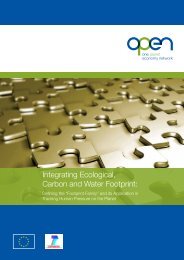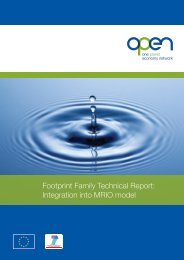OPEN: EU Scenario Storylines Report: - One Planet Economy Network
OPEN: EU Scenario Storylines Report: - One Planet Economy Network
OPEN: EU Scenario Storylines Report: - One Planet Economy Network
You also want an ePaper? Increase the reach of your titles
YUMPU automatically turns print PDFs into web optimized ePapers that Google loves.
Executive Summary<br />
A set of future scenarios were developed as part of the <strong>OPEN</strong>:<strong>EU</strong> project to help support<br />
policy makers in thinking about the policy effort needed to transform Europe into a <strong>One</strong><br />
<strong>Planet</strong> <strong>Economy</strong> 1 by 2050. This report provides an overview of the methodology that was<br />
used by the project team in the development of the scenarios, and an illustration of how<br />
life would be in 2050 in each of the scenarios. It places this scenario exercise in the<br />
context of the <strong>EU</strong>‘s overarching plan for smart, sustainable and inclusive growth over the<br />
coming decades as well as in the perspective of other existing scenario exercises that<br />
address similar themes.<br />
There are four narratives that provide alternative, albeit not necessarily ideal, visions of<br />
the transition toward a <strong>One</strong> <strong>Planet</strong> <strong>Economy</strong> in Europe by 2050. They present both an<br />
illustration of life in Europe in 2050 and the policy settings that are necessary to support<br />
the transition to this common end point under different assumptions about the future.<br />
The scenarios were developed via a back-casting exercise on the basis of stakeholder<br />
input provided during a two-day workshop in September 2010.<br />
<strong>Scenario</strong> 1, ―Clever and Caring‖, assumes rapid technological change combined with a<br />
high level of preparedness to move away from materialism and the traditional focus on<br />
economic growth. This enables a relatively painless shift to a high-tech, but more caring,<br />
collaborative and sustainable society. In this world, Europeans recognise that sustainable<br />
lifestyles are paramount to the continued function of global ecosystems and the livelihood<br />
of future generations. Competition has largely been replaced by cooperation. Planned<br />
obsolescence of technology has been replaced by planned durability and reuse. The<br />
European health and education systems reflect holistic social values. Social innovation 2<br />
flourishes at the neighbourhood, city and regional levels due to robust participatory<br />
governance and ample time availability for personal activities. Nearly 95% of farms in the<br />
<strong>EU</strong> are organic or permaculture-based. The financial system is radically different and has<br />
broadened its focus from the short-term and profit-driven models of lending to include<br />
social and environmental considerations. Energy infrastructure is largely decentralised<br />
and flexible.<br />
<strong>Scenario</strong> 2, ―Fast Forward‖, assumes the economic growth focus of today will continue<br />
to be a driving force. The transformation to a <strong>One</strong> <strong>Planet</strong> <strong>Economy</strong> has to be spurred on<br />
more aggressively by policies designed to maximise the potential of technological<br />
innovation to improve resource efficiency, to constrain overall consumption and to deal<br />
with global distributional issues. Without a ―green tech revolution‖ and strong political<br />
action, Europe would have been unlikely to stay within the limits of a <strong>One</strong> <strong>Planet</strong><br />
<strong>Economy</strong>, and there would have been a high risk of social and economic instability at<br />
global and regional levels. About 70-80% of Europeans live in a highly modern city in<br />
high-tech accommodation located in close proximity to work and personal, social and<br />
community services. Improvements in energy efficiency have helped drive the decoupling<br />
of energy use from economic growth between 2011 and 2050 beyond current trends (in<br />
transport, for example, there has been a large-scale reduction on the dependency on<br />
1<br />
A <strong>One</strong> <strong>Planet</strong> <strong>Economy</strong> is an economy that respects all environmental limits and is socially and financially<br />
sustainable, enabling people and nature to thrive.<br />
2<br />
A social innovation is a novel solution to a social problem that is more effective, efficient, sustainable, or just<br />
than existing solutions and for which the value created accrues primarily to society as a whole rather than<br />
private individuals (Phills, et al., 2008, p. 36).<br />
Page 5 of 57





